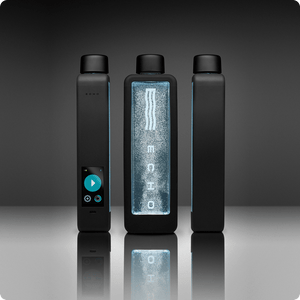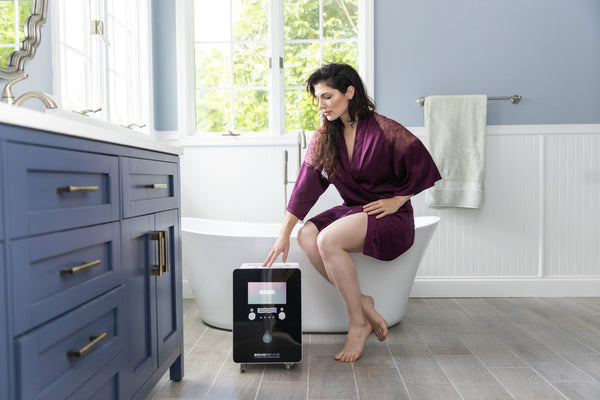You’re trying to drink more water to feel better, but when you walk down the grocery aisle or scroll online, you see all kinds of “upgraded” waters—carbonated, mineral, alkaline, and now, hydrogen water.
Two popular options—hydrogen water and carbonated water, which may seem the same in a bottle, but work very differently in your body. Carbonated water (or sparkling water) is for flavor and fizz while hydrogen water supports how you feel, move, and recover.
Let’s break down the real difference—and why it matters for your health.
What Is Hydrogen Water?
Hydrogen water is regular drinking water—but with extra help built in. It contains molecular hydrogen gas (H₂), which happens to be an effective antioxidant.
This gas is tiny enough to slip into your cells and help your body defend against harmful free radicals—molecules that can damage cells and speed up aging. More than 1,000 scientific studies have explored how hydrogen-enriched water may support:
-
A balanced inflammatory response
-
Natural energy and focus
-
Recovery after workouts or stress
-
Better hydration at the cellular level
What Is Carbonated Water?
Carbonated water is water that’s been infused with carbon dioxide (CO₂) gas. That’s what gives it the bubbles and the fizz.
You’ve seen it sold as:
-
Sparkling water
-
Club soda
-
Seltzer
Some people drink it as a soda alternative. It can also taste refreshing and make plain water more exciting, but carbonated water is all about sensation, not wellness.
Here’s what to know:
-
It doesn’t add nutrients or hydrogen.
-
It doesn’t support recovery, performance, or cellular health.
-
For some people, it can cause bloating, gas, or acid buildup.
Why Hydrogen Water Is Gaining Popularity in Recent Years
In recent years, hydrogen water has seen a rise in popularity—not because of hype, but because of its beneficial effects on how people feel day to day.
Unlike carbonated drinks, which are marketed for taste, hydrogen water has been explored for its role in:
-
Supporting a balanced inflammatory response
-
Promoting natural energy
-
Aiding in cellular recovery after stress or exercise
These beneficial effects have been linked to how molecular hydrogen interacts with the body—especially its potential to help neutralize harmful free radicals and support your body’s natural defenses against oxidative stress.
Hydrogen water is now available in more convenient formats than ever before:
-
Portable pouches for travel or on-the-go use
-
Refillable flasks and bottles that generate hydrogen instantly
-
At-home machines for unlimited access
Because hydrogen gas is so small, it can penetrate cells quickly—but it also escapes from containers fast. That’s why choosing high-quality packaging, like Echo’s sealed pouches or self-generating flasks, matters if you want to get the full effect.
Hydrogen Water vs Carbonated Water: A Comparison
Let's make this comparison breakdown simple:
|
Feature |
Hydrogen Water |
Carbonated Water |
|
Gas Used |
Molecular hydrogen (H₂) |
Carbon dioxide (CO₂) |
|
Main Purpose |
Supports wellness and recovery |
Adds fizz and taste |
|
Health Benefits |
Studied for hydration, energy, and oxidative stress support |
No known health benefits |
|
Effect on Body |
May help reduce free radicals and support natural energy |
May cause bloating or acidity |
|
Taste |
Neutral, like regular water |
Fizzy, sharp, sometimes flavored |
What the Research Says About Hydrogen Water
Hydrogen water isn’t just a trend—it’s been explored in over 1,000 peer-reviewed studies for its potential health benefits.
What researchers have studied:
-
Oxidative stress:
Preliminary studies suggest hydrogen water may help the body manage oxidative stress, which is linked to fatigue, aging, and cellular damage. -
Metabolic support:
Some research has explored how hydrogen water could support healthy glucose levels and overall metabolic function in people with potential metabolic syndrome. -
Athletic recovery:
In small studies, athletes who drank hydrogen-rich water showed less muscle fatigue and lower levels of lactic acid after exercise. -
Hydration and energy:
Early research suggests hydrogen may help cells stay hydrated longer, which could support natural energy throughout the day.
When Should You Drink Hydrogen Water vs Carbonated Water?
Choose hydrogen water when:
-
You want to support energy and focus without caffeine
-
You’re recovering from a workout or long day
-
You feel fatigued, sluggish, or mentally off
-
You care about cellular hydration and reducing oxidative stress
-
You’re managing your health and want more than just hydration
Choose sparkling water when:
-
You want something fizzy or crave bubbles
-
You’re cutting back on soda and need a replacement
-
You’re enjoying a meal or social occasion
-
You’re not looking for health benefits—just taste
FAQ:
Is hydrogen water the same as sparkling water?
No. Sparkling water contains carbon dioxide, which gives it fizz. Hydrogen water contains molecular hydrogen, a natural antioxidant that may help support energy, hydration, and recovery. No fizz—just function.
Can I get the same benefits from carbonated water?
No. Carbonated water is mainly for taste. It doesn’t contain hydrogen gas and isn’t linked to any health benefits. Hydrogen water is different—it’s backed by over 1,000 studies exploring its impact on oxidative stress, metabolism, and cellular health.
How is hydrogen water made, and how is it different from carbonated water?
Hydrogen water is made through a process called electrolysis, where an electric current splits water into hydrogen and oxygen, adding pure hydrogen gas (H₂) into the water. Carbonated water, on the other hand, is made by infusing water with carbon dioxide (CO₂) gas, which creates bubbles but offers no known health benefits. Hydrogen water supports wellness. Carbonated water supports taste.
Can I use carbonated water in my hydrogen flask?
No. You should only use plain, non-carbonated water in your hydrogen flask. Carbonated water contains carbon dioxide (CO₂), which can interfere with the electrolysis process and damage the device. For best results—and to safely generate molecular hydrogen (H₂)—always use clean, filtered water without bubbles or additives.




